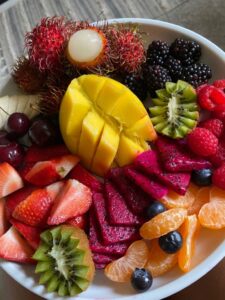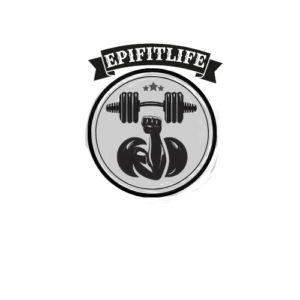Nourish Your Body: A Guide to a Healthy Diet
Maintaining a healthy lifestyle is closely tied to your diet. A balanced and nutritious diet is essential for physical health, mental well-being, and overall vitality. In this guide, we will explore the key components of a proper diet for a healthy lifestyle.

1. Balanced Macronutrients-A part of healthy diet:
A healthy diet should provide you with the right balance of macronutrients:
Proteins:
Proteins are the building blocks of your body. They are essential for repairing and building tissues. Good sources of protein include lean meats, poultry, fish, eggs, dairy products, legumes, and plant-based options like tofu and tempeh.
Carbohydrates:
Carbs are your body’s primary source of energy. Choose complex carbohydrates from sources like whole grains, fruits, vegetables, and legumes. These foods provide fiber, vitamins, and minerals in addition to energy.
Fats:
Healthy fats are crucial for various bodily functions and should be part of your healthy diet. Include sources of unsaturated fats like avocados, nuts, seeds, olive oil, and fatty fish (e.g., salmon). Limit saturated and trans fats, often found in processed and fried foods.
2. Fiber-Rich Foods:
Fiber is essential for digestive health and can help control blood sugar levels and promote a feeling of fullness. Foods high in fiber include whole grains, fruits, vegetables, legumes, and nuts. A healthy diet rich in fiber can reduce the risk of chronic diseases like heart disease and type 2 diabetes.
3. Plenty of Fruits and Vegetables:

Fruits and vegetables are packed with essential vitamins, minerals, antioxidants, and fiber. Aim to include a variety of colorful fruits and vegetables in your healthy diet to ensure you get a wide range of nutrients. These foods can help reduce the risk of chronic diseases and promote overall health. Vegetables and fruits are packed with essential vitamins and minerals, such as vitamin C, vitamin A, potassium, and folate. These nutrients are crucial for maintaining good health and supporting various bodily functions.
4. Hydration:
Staying well-hydrated is fundamental to good health. Water is essential for digestion, circulation, temperature regulation, and more. Aim to drink plenty of water throughout the day, and adjust your intake based on your activity level and climate.
5. Lean Proteins:
Choose lean sources of protein to minimize saturated fat intake. Skinless poultry, fish, lean cuts of beef, and plant-based protein sources like tofu and legumes are excellent choices. Protein is crucial for muscle repair and overall health.
6. Whole Grains:
Whole grains like brown rice, quinoa, whole wheat bread, and oats provide more nutrients and fiber compared to refined grains. They can help regulate blood sugar levels and provide sustained energy.Whole grains provide a steady and sustained release of energy due to their complex carbohydrate content. This can help maintain energy levels and prevent energy crashes throughout the day.
7. Limit Added Sugars:
Excess sugar in the diet has been linked to various health issues, including obesity, type 2 diabetes, and heart disease. Limit your intake of sugary snacks, sugary beverages, and foods with added sugars. Opt for natural sweeteners like honey, maple syrup, or agave nectar when necessary.
8. Healthy Snacking:
If you need snacks between meals, choose nutritious options like fresh fruit, raw nuts, yogurt, or whole-grain crackers with hummus. Avoid processed and high-calorie snacks that are low in nutrients.
9. Portion Control:
Even healthy foods can contribute to weight gain if consumed in excessive amounts. Be mindful of portion sizes, and use smaller plates to help control your food intake. Listen to your body’s hunger and fullness cues.
10. Adequate Micronutrients:
In addition to macronutrients (carbohydrates, proteins, fats), ensure you get a range of vitamins and minerals. A well-balanced diet should provide you with essential micronutrients, but if you have specific dietary restrictions or needs, consider supplementation or consulting a healthcare professional.
11. Moderation and Balance:
Enjoy a variety of foods in moderation. A diet that is too restrictive can be difficult to sustain and may not provide all the nutrients your body needs. Balance is key.
12. Mindful Eating:
Practice mindful eating by paying attention to your food and savoring each bite. Avoid eating in front of screens or while distracted, as this can lead to overeating.
13. Meal Planning:
Plan your meals ahead of time to ensure that you have access to healthy options and don’t rely on convenience or fast food. Preparing meals at home allows you to control the ingredients and portion sizes.
14. Limit Processed Foods:
Processed foods often contain high levels of salt, sugar, and unhealthy fats. Minimize your consumption of processed foods and opt for whole, unprocessed ingredients whenever possible.
15. Special Dietary Considerations:
If you have specific dietary needs or restrictions, such as food allergies, intolerances, or medical conditions like celiac disease, it’s important to tailor your diet accordingly. Consult with a healthcare professional or dietitian to create a suitable eating plan.Some individuals have food allergies, which can trigger severe and sometimes life-threatening reactions. Common food allergens include peanuts, tree nuts, eggs, milk, soy, wheat, fish, and shellfish. People with food allergies need to carefully avoid these allergens and often rely on ingredient labels and allergy-friendly alternatives.
conditions like celiac disease, it’s important to tailor your diet accordingly. Consult with a healthcare professional or dietitian to create a suitable eating plan.Some individuals have food allergies, which can trigger severe and sometimes life-threatening reactions. Common food allergens include peanuts, tree nuts, eggs, milk, soy, wheat, fish, and shellfish. People with food allergies need to carefully avoid these allergens and often rely on ingredient labels and allergy-friendly alternatives.
16. Listen to Your Body:
Pay attention to your body’s signals. Eat when you’re hungry, stop when you’re satisfied, and respect your body’s cues for nourishment.
17. Avoid Overeating:
Eating in excess of your energy needs can lead to weight gain. Practice portion control and be aware of emotional eating triggers.
18. Regular, Balanced Meals:
Eat at regular intervals to maintain steady energy levels throughout the day. Skipping meals can lead to overeating later on.
19. Cooking Methods:
Use healthier cooking methods like baking, grilling, steaming, or sautéing with minimal oil. Avoid deep-frying, as it can add excess calories and unhealthy fats to your food.
20. Include Healthy Snacks:

If you need snacks, opt for nutritious options like Greek yogurt, fruits, veggies with hummus, or nuts. Healthy snacks can help maintain your energy levels between meals.
21. Avoid Excessive Alcohol:
Alcohol can add empty calories to your diet and impair your judgment regarding food choices. If you drink, do so in moderation but masive drinking and taking drungs can be harmful for your health, so consume it in moderation. There is a saying by – Thomas Edison
“The doctor of the future will no longer treat the human frame with drugs, but rather will cure and prevent disease with nutrition.“
22. Dietary Diversity:
Aim to eat a wide variety of foods to ensure you get a broad spectrum of nutrients. Don’t rely on a small set of favorite dishes; instead, explore different cuisines and ingredients.
23. Consistency:
A healthy diet isn’t a short-term fix; it’s a lifelong commitment. Consistency is key to maintaining a healthy lifestyle and reaping its long-term benefits.
24. Seek Professional Guidance:
If you have specific dietary goals, health conditions, or fitness objectives, consider working with a registered dietitian or nutritionist who can provide tailored guidance.
In conclusion, a proper diet for a healthy lifestyle focuses on balance, variety, and moderation. It’s about nourishing your body with the nutrients it needs to function optimally while enjoying the food you eat. Remember that a healthy lifestyle encompasses not only your diet but also regular physical activity, adequate sleep, stress management, and other factors. Strive for a holistic approach to health, and consult with healthcare professionals when needed to create a personalized plan that suits your unique needs and goals.


Definitely believe that which you said. Your favorite justification appeared to be
on the net the easiest thing to be aware of. I say to you,
I certainly get annoyed while people think about worries that they just don’t know about.
You managed to hit the nail upon the top and defined out the
whole thing without having side-effects
, people could take a signal. Will probably be back to get more.
Thanks
Hello! Someone in my Myspace group shared this site
with us so I came to give it a look. I’m definitely loving the information.
I’m book-marking and will be tweeting this to my followers!
Terrific blog and superb design and style.
Hey there! Are you tired of those pesky pop-up ads and expensive subscriptions to watch quality adult movies or videos? Well, look no further! Our newly launched adult streaming website offers a paradise of premium quality porn videos for free, without any annoying interruptions. Experience the thrill of our exclusive collection in Full HD without breaking the bank. Don’t miss this opportunity to indulge in hassle-free top class adult entertainment. Visit our website now and explore our tempting selection.
Our Website: https://play.pornlovers.world
Enjoy!